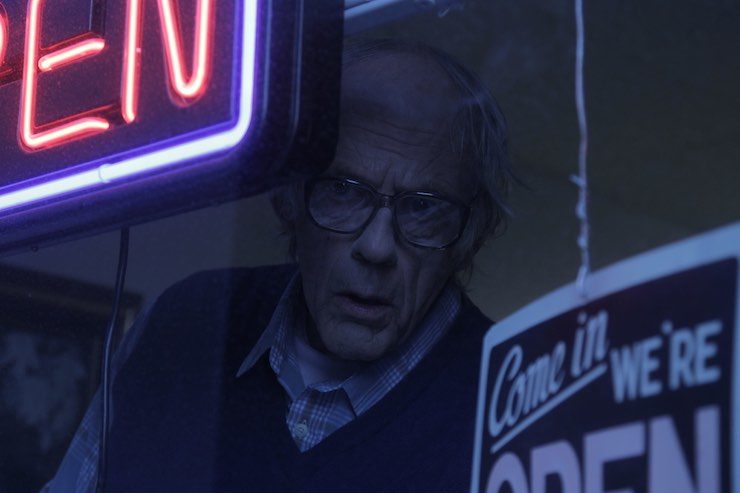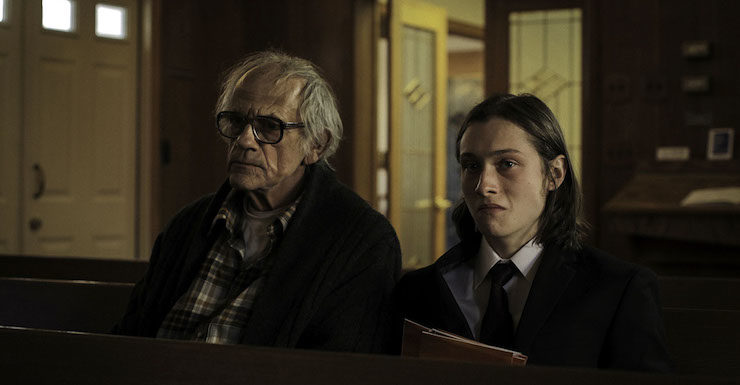IFC Midnight and director Billy O’Brien have brought Dan Wells’s I Am Not a Serial Killer to life on the screen, starring Max Records and Christopher Lloyd. Our protagonist, John Wayne Cleaver, is a teenage sociopath attempting to keep his life together and himself in check with the help of his therapist and small-town associates. This is, of course, until a rash of serial murders begin in his town—and there’s something more or less than human behind them.
When the novel was originally published—six years ago—I found it reasonably compelling and entertaining, as evidenced by this review. It had some narrative hiccups but a strong use of voice and an engaging internal conflict for the protagonist; overall, I thought it was decent. So, when I had the chance to scope out an adaptation from IFC, I thought: why not?
Spoilers ahead.
The film, much like the source text, has strengths and weaknesses—and interestingly, they’re almost opposite. While Wells’s novel does a mediocre to poor job of building tension about the nature of the evil stalking the town of Clayton, O’Brien’s adaptation gets rid of the reflective mode and presents a linear narrative. During the murder John initially witnesses on the lake it comes as a surprise that the old kindly neighbor Crowley, played to delightful effect by Christopher Lloyd, is actually a monster. Compared to the novel, there’s far more tension in the narrative as the movie builds up to this revelation, while John’s young friend jokes about werewolves and John tries to be a detective.
Unfortunately, the subtraction of the point-of-view narrative also does the text a disservice: the audience misses out on the compelling struggle within our protagonist against himself, his world, and his urges. Part of the reason Wells’s novel was so engaging was John-as-narrator. It was a unique perspective, invested with a great deal of struggle and intensity. Without that, the narrative itself falls a bit flat: we have less sense of the stakes, even if John explains a few of them (his strategy of paying compliments to potential victims when he feels violent, et cetera).
While O’Brien has increased the tension in the plot as it progresses into a game of cat and mouse between John and the monster, the tension in terms of character growth and conflict has flatlined. The end result is a film that drags a bit during the middle, once we’ve figured out the nature of the murders but John isn’t acting on the knowledge yet—just following Crowley and watching people be slaughtered by him. The internal conflict would have brought some life to those scenes; instead, John barely hints at it in his conversations with the therapist.
The screen doesn’t necessarily lend itself to that kind of narration, of course, but something else could have stood in for it, to help even out the pacing. As it was, I found myself less engaged in the continuing story even once we arrived at the endgame. Also, the decision to spend a relatively long period of screen time—several minutes—with a CGI “demon” talking to John and his mother made me sigh with frustration. The creature wasn’t particularly frightening or realistic, and the CGI didn’t blend as well as it could have with the film scenery and the prior usage of effects. The classic horror movie problem: show too much incorrectly and it goes from scary or compelling to silly. This leapt across the line into “silly,” which is a real shame, considering that the scene could have had a lot of poignancy and heft.
I also found the plotline with Brooke to be shoehorned in and underdeveloped in the film. She plays little part except being a girl who shows up occasionally to be not freaked out by John. That presents a narrative dead-end that we don’t have enough of a sense of to become invested in. John’s mother is also a lesser figure here. The compressed nature of the film relegates most of the characters who aren’t either John, the neighbor/monster Crowley, or his therapist to secondary or tertiary roles; however, it still tries to include them, sometimes to greater success than others.

As a whole, I Am Not a Serial Killer is a decent adaptation of decent source material. It was visually compelling, and Max Records does a good job showing John’s compulsions and awkwardness through tiny details of body language and tone. Christopher Lloyd, rather obviously, makes for a sympathetic but terrifying demon/serial killer who desperately adores his wife in spite of the odds stacked against them. The small-town tension is believable, though the accelerated pace of the murders is a little hard to swallow. As a psychological sort-of scary movie, it does a decent job of getting the audience invested and making them uncomfortable.
While it does drag a bit, it was a fine enough movie for the folks who’ll be interested in it—though a bit less of a stand-out than the original novel. I would’ve liked more of the mother and family dynamics, and more of the complicated relationship with Brooke, to flesh out the rather-heavily-gendered scale of narrative interest the movie presents. As a whole, though, O’Brien and his cast have done a solid job of bringing Wells’s book to the screen.
Lee Mandelo is a writer, critic, and editor whose primary fields of interest are speculative fiction and queer literature, especially when the two coincide. They have two books out, Beyond Binary: Genderqueer and Sexually Fluid Speculative Fiction and We Wuz Pushed: On Joanna Russ and Radical Truth-telling, and in the past have edited for publications like Strange Horizons Magazine. Other work has been featured in magazines such as Stone Telling, Clarkesworld, Apex, and Ideomancer.










